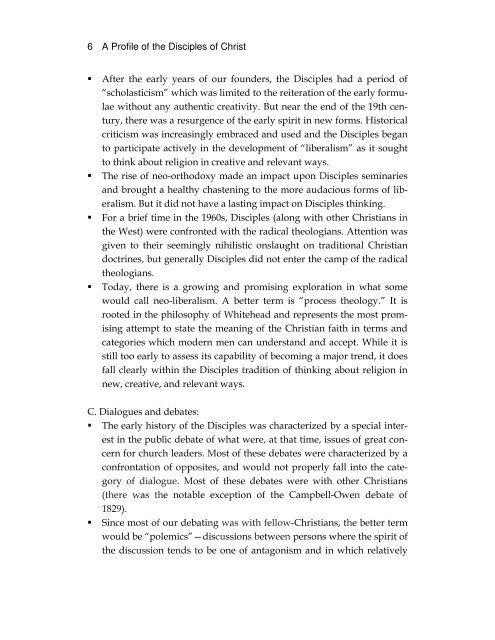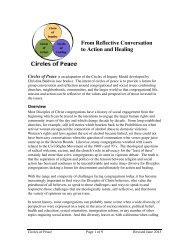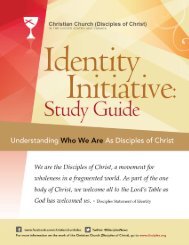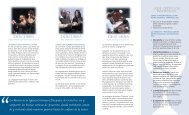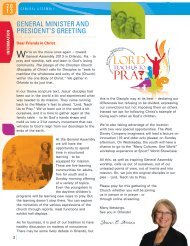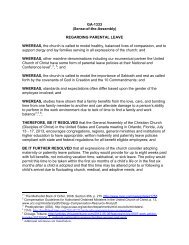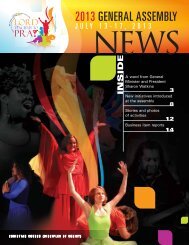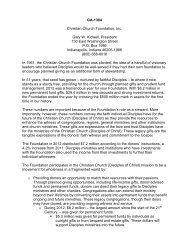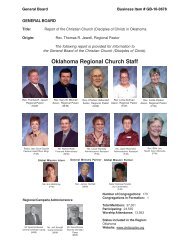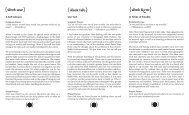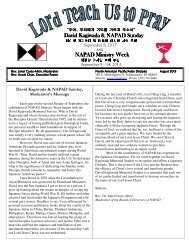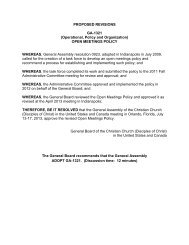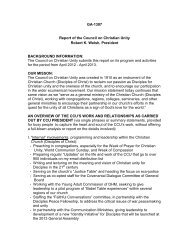"A Profile of the Disciples of Christ" by T.J. Liggett - Christian Church ...
"A Profile of the Disciples of Christ" by T.J. Liggett - Christian Church ...
"A Profile of the Disciples of Christ" by T.J. Liggett - Christian Church ...
Create successful ePaper yourself
Turn your PDF publications into a flip-book with our unique Google optimized e-Paper software.
6A <strong>Pr<strong>of</strong>ile</strong> <strong>of</strong> <strong>the</strong> <strong>Disciples</strong> <strong>of</strong> Christ After <strong>the</strong> early years <strong>of</strong> our founders, <strong>the</strong> <strong>Disciples</strong> had a period <strong>of</strong>“scholasticism” which was limited to <strong>the</strong> reiteration <strong>of</strong> <strong>the</strong> early formulaewithout any au<strong>the</strong>ntic creativity. But near <strong>the</strong> end <strong>of</strong> <strong>the</strong> 19th century,<strong>the</strong>re was a resurgence <strong>of</strong> <strong>the</strong> early spirit in new forms. Historicalcriticism was increasingly embraced and used and <strong>the</strong> <strong>Disciples</strong> beganto participate actively in <strong>the</strong> development <strong>of</strong> “liberalism” as it soughtto think about religion in creative and relevant ways. The rise <strong>of</strong> neo-orthodoxy made an impact upon <strong>Disciples</strong> seminariesand brought a healthy chastening to <strong>the</strong> more audacious forms <strong>of</strong> liberalism.But it did not have a lasting impact on <strong>Disciples</strong> thinking. For a brief time in <strong>the</strong> 1960s, <strong>Disciples</strong> (along with o<strong>the</strong>r <strong>Christian</strong>s in<strong>the</strong> West) were confronted with <strong>the</strong> radical <strong>the</strong>ologians. Attention wasgiven to <strong>the</strong>ir seemingly nihilistic onslaught on traditional <strong>Christian</strong>doctrines, but generally <strong>Disciples</strong> did not enter <strong>the</strong> camp <strong>of</strong> <strong>the</strong> radical<strong>the</strong>ologians. Today, <strong>the</strong>re is a growing and promising exploration in what somewould call neo-liberalism. A better term is “process <strong>the</strong>ology.” It isrooted in <strong>the</strong> philosophy <strong>of</strong> Whitehead and represents <strong>the</strong> most promisingattempt to state <strong>the</strong> meaning <strong>of</strong> <strong>the</strong> <strong>Christian</strong> faith in terms andcategories which modern men can understand and accept. While it isstill too early to assess its capability <strong>of</strong> becoming a major trend, it doesfall clearly within <strong>the</strong> <strong>Disciples</strong> tradition <strong>of</strong> thinking about religion innew, creative, and relevant ways.C. Dialogues and debates: The early history <strong>of</strong> <strong>the</strong> <strong>Disciples</strong> was characterized <strong>by</strong> a special interestin <strong>the</strong> public debate <strong>of</strong> what were, at that time, issues <strong>of</strong> great concernfor church leaders. Most <strong>of</strong> <strong>the</strong>se debates were characterized <strong>by</strong> aconfrontation <strong>of</strong> opposites, and would not properly fall into <strong>the</strong> category<strong>of</strong> dialogue. Most <strong>of</strong> <strong>the</strong>se debates were with o<strong>the</strong>r <strong>Christian</strong>s(<strong>the</strong>re was <strong>the</strong> notable exception <strong>of</strong> <strong>the</strong> Campbell-Owen debate <strong>of</strong>1829). Since most <strong>of</strong> our debating was with fellow-<strong>Christian</strong>s, <strong>the</strong> better termwould be “polemics”—discussions between persons where <strong>the</strong> spirit <strong>of</strong><strong>the</strong> discussion tends to be one <strong>of</strong> antagonism and in which relatively


